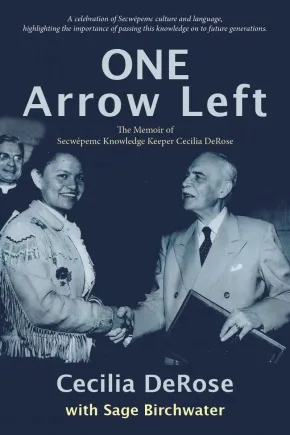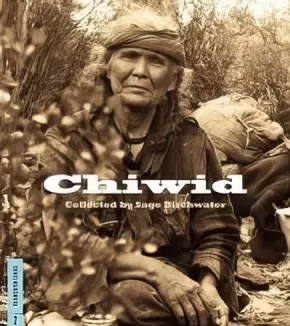Sage Birchwater
Born and raised in Victoria, Sage Birchwater currently lives in Taklayoko, outside of Williams Lake, BC where he is a freelance writer and editor. In addition to Chiwid, he has written extensively on the Ulkatcho people. He has also worked as a photographer, trapper, environmentalist educator and oral history researcher.
Books (1)
Synopsis:
Secwépemc elder, matriarch and knowledge-keeper Cecilia DeRose presents her powerful, heartfelt and inspiring memoir of overcoming racism and adversity—One Arrow Left is a celebration of Secwépemc culture, language and the importance of passing on this knowledge to future generations.
Born in 1935 in the village of Esket, Cecilia DeRose was welcomed into a loving, supportive Secwepemc family. Growing up in an isolated meadow, Cecilia was the fourth of ten children, spending much of her early years caring for younger siblings. Ranch life was in their blood; Cecilia’s mother, Amelia Joe, was the progeny of a white ranch hand, Joe Smith, and her Secwepemc mother, Martha Williams; her father, Matthew Dick, was well-known in the Williams Lake rodeo circuit and played for the famous Alkali Braves hockey team. Navigating the complexities of being a mixed-race family, both within and outside of the Secwepemc community, would be a lifelong source of tension, which Cecilia handles with grace, tenacity and humour.
Like their parents before them, Cecilia and her siblings were sent to St. Joseph’s Mission residential school near Williams Lake. At seven years old she eagerly awaited her turn to join her older sister and brother at the mission, where she could escape the drudgery of washing diapers and caring for her younger siblings at home. Nothing could have prepared her for the cruelty of institutionalized life. Dreams of an education that might lead to a career as a teacher, lawyer, or journalist were dashed. Residential school was hell, and Cecilia was left with the scars to prove it.
In 1956, Cecilia married non-Indigenous ranch hand Lenny DeRose and lost her Indigenous status. Nevertheless, on the insistence of her father Matthew Dick, Cecilia remained true to her Secwepemc roots and traditions. She eventually regained her status and became an ambassador of Secwepemc language and cultural practices. As she raised her own six children, she took great care to bestow in them the cultural teachings of the Secwepemc identity. She eventually taught the Secwepemcstin language in the public-school system, fulfilling her dream of teaching and reinforcing her belief that “we have one arrow left in our quiver and that’s education—we must use it wisely.”
Today, Cecilia is recognized nationally as an Indigenous knowledge keeper. She has provided cross-cultural training for hospitals, courts, and law enforcement institutions, and shared her knowledge on projects ranging from ethnobotany research to culturally safe elder care. In 2018, she received the Indspire Award for Culture, Heritage and Spirituality. In 2024, she was honoured by Thompson Rivers University with a Doctor of Letter, honoris causa, for her indispensable contributions to language revitalization.
Additional Information
224 pages | 6.00" x 9.00" | Paperback
Teen Books (1)
Synopsis:
Chiwid was a Tsilhqot'in woman, said to have shamanistic powers, who spent most of her adult life "living out" in the hills and forests around Williams Lake, BC. Chiwid is the story of this remarkable woman told in the vibrant voices of Chilcotin oldtimers, both native and non-native.
Reviews
"Chiwid was a Chilcotin woman who lived outside, self-sufficiently for most of her life and moving camps with the seasons. Chiwid is a collection of oral histories about the woman, her family and what life was like in the Chilcotin area of British Columbia in the early to mid-1900s." - The Association of Book Publishers of BC. BC Books for BC Schools. 2009-2010.
Additional Information
128 pages | 8.00" x 9.00"
Authenticity Note: This book's author is not Indigenous; however, the book has the Authentic Indigenous Text label because it contains stories collected by the author from Indigenous and non-Indigenous peoples. It is up to readers to determine if this book will work as an authentic text for their purposes.








